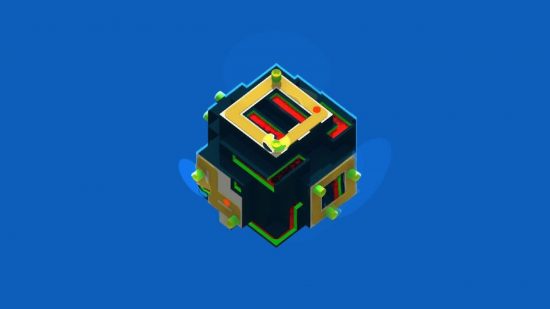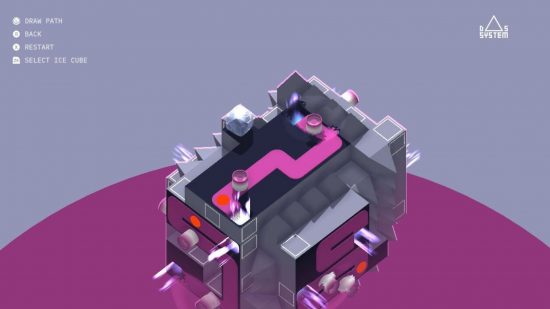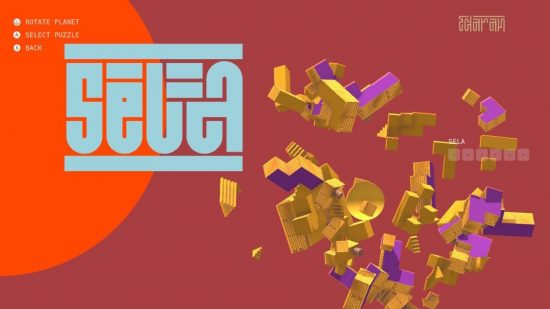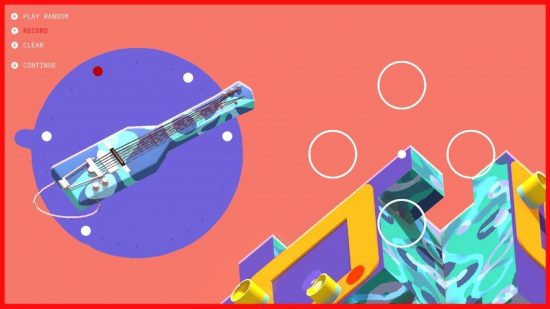Games that revolve around music often lack a certain depth. There’s fun to be had with classic titles like Guitar Hero and Taiko No Tastujin, but there’s the absence of substance, and you come away with nothing but a few sore fingers from frantic button-bashing. Then there’s Rytmos, a game from Floppy Club, that makes me look like an idiot by going completely against the grain by creating a music-orientated title with one of the sonic arts’ key ingredients – the abstract component of ‘feel’ – and in doing so, offers a planetary record collection with the best of our own rock’s colourful compositions.
I should start this review by saying that I’m something of a musicologist – yes, that’s a proper term, I should know, I paid for the degree – and so I’m well aware that I sit comfortably within the target demographic for Rytmos. But it also gives me a little more scope to properly assess this title’s interpretation of concepts like world music – a term that covers a massive amount of exciting genres like an ugly big blue tarpaulin – and I can say from the off that the approach to musical cultures in this game is as comprehensive as you’ll find outside of tedious academics and stale NPR documentaries.
With that out of the way, let’s get into the core gameplay ideas that ground Rytmos – or rather, those that lift it into orbit. You begin each level looking at a six-sided planet based on a specific musical style, with those available ranging from Mbira music of Zimbabwe, German electronic, and Ethiopian jazz. Your task is to finish the six puzzles across each face of the planet, with every complete path adding another layer to the sonic tapestry unfolding before your very ears. Once the puzzle is complete, you can jam along with the beat you created using the planet’s related instrument, and send that mother into space while adding a snazzy record to your collection.
The puzzles themselves are tricky little numbers with the objective being to connect a path from the start point to include certain markers before returning to its origin. The gimmick is in that once you begin a line, you can’t stop until you meet an edge, and so what might seem like an easy path to join up can quickly become a nuisance, but a funky nuisance nonetheless. As you progress further through the planets, more challenging mechanics arrive, but despite my wording, they never feel gimmicky, and the variety of musical genres attached to the orbiting rocks keeps things fresh time and time again.
I say more challenging planets arrive, but admittedly, the puzzles never get too challenging. This is fitting for the most part, you can tell from every element of Rytmos that it’s not intended to have you screaming at the same puzzle for four hours, but if you do start to want a bit of a test, unfortunately, that never really comes through. Still, you can’t always have your cake and eat it, and faced with the decision between this and a puzzler intent on making my head spin, I’ll be making shapes in Rytmos any day of the week.
The positive of Rytmos lacking in a brain-busting challenge is that there’s a zen-like nature to the challenges of each planet, with a familiar feel and aesthetic to titles like Monument Valley, Golf Peaks, or Cuzzle. The puzzles aren’t here to blow your tiny mind, but instead, they merge with the music to form what you might call the perfect distraction – almost the antithesis of titles like Candy Crush that demand high engagement and have a price to pay for failure, but somehow, manipulating the brain into taking on more levels just in the same way. I say this as someone who finished Rytmos in two sittings and has gone back for second and third helpings.
In terms of design, Rytmos manages to intelligently match up its musical pieces with mini-worlds that perfectly represent them, from the purple and black abrasiveness of Das System, the German electro-inspired zone, to Kame, the brown, green, and blue of the Mbira inspired planet mirroring the colours of the earth and the plains of Zimbabwe. Even despite the jarring differences between these two genres, Rytmos manages to every planet feel perfectly at home belonging to the same universe.
As I mentioned earlier, on completing a planet’s puzzles, you can use the instrument specific to the genre of the planet to add a few notes to the loop. This mechanic works best with a melodic instrument, like the electric guitar or organ, with four separate note options or a randomiser button to input your sounds. It doesn’t come off quite as well when it comes to percussion instruments, with the options condensed down to two tones that struggle to fit the groove of the backing track as hard as you try, but that doesn’t mean you shouldn’t try out every instrument.
Once you’re happy with your loop, you can send the planet off into orbit to join a symphony of celestial bodies, while your finished track shrinks down into a vinyl complete with its own cover art before falling into your collection. There’s a definite sense of fulfilment in completing a planet while watching the record drop into your growing collection, and better still, you can revisit that jam anytime you like from your record collection.
The pieces of music that you help to create by solving each planet’s puzzles are clear and crisp in terms of audio quality, with even the neutral level select secret screen offering dulcet tones that warm the ears up for the treats in store on your quest to jam across the galaxy. There’s a conscious choice of both musical palettes and colour tones that make Rytmos feel vibrant and a pleasure to play. With each planet I completed, I’d sit for a minute and listen to the full composition, nodding my big old head to the track before jumping out of the gravitational sphere and heading to the next destination.
It’s not just a few nifty puzzles, tunes, and planets here though, there’s something to learn too. Not in a patronising way, Rytmos is by no means forcing this stuff down your throat, but each unlocked planetary genre and instrument has some context attached, a short description of how it came to be, often including the cultural origins that sheds a little light on both Rytmos’ musical universe and our own.
To me, Rytmos feels like the best music museum you’ve ever been to, using engaging puzzles to enlighten players on just what they’re missing out on when they tar different genres under the world music umbrella regardless of culture, location of origin, or even sonic similarities. Of course, the Kraftwerkian synth world offers up some recognisable musical palettes, but for me, it’s in the levels with music much less familiar to the Western ear that the game really comes to life. It’s teaching you something while you have a good time, something my science teacher said never possible, and something incredibly important when it comes to music, which is after all a relic of individual cultures, or indeed their clashing.
It’s worth mentioning that performance on Switch is seamless, as you would expect from a game that looks like it had a deft touch of detail from a loving team of developers. Gameplay is cohesive, there’s no stutter or lag, and the audio and visual matchup is perfect, making it feel that little bit better when you complete a puzzle and it all joins up with the beat. Even writing about it now I just want to jump back on Kame and do me some puzzling.

So, now Rytmos is here on Switch, I wholeheartedly recommend you grab your most high-quality pair of headphones, close the curtains, and let this lovingly crafted title transport you to an interplanetary museum of music with sounds that represent the best of what our own little rock can offer culturally, if you were just to pull back the veneer of what you thought you know about sounds from around the world. Trust me, it’s worth the admission price.
If our mentioning Monument Valley caught your ear, be sure to check out our Monument Valley interview for some fascinating facts about how the game made Ustwo Games what it is today. Or, for some more jamming good times, see our picks for the best music games.
Rytmos Nintendo Switch review
Rytmos is a veritable delight for the music-loving puzzle gamer, with a solid few hours of engaging gameplay, insightful descriptions, and vivid colour. There could be the option of more challenge, and percussion instruments don’t quite live up to their melodious counterparts, but all-in-all, Rytmos is a jam I’m going to have on repeat for a long time.















